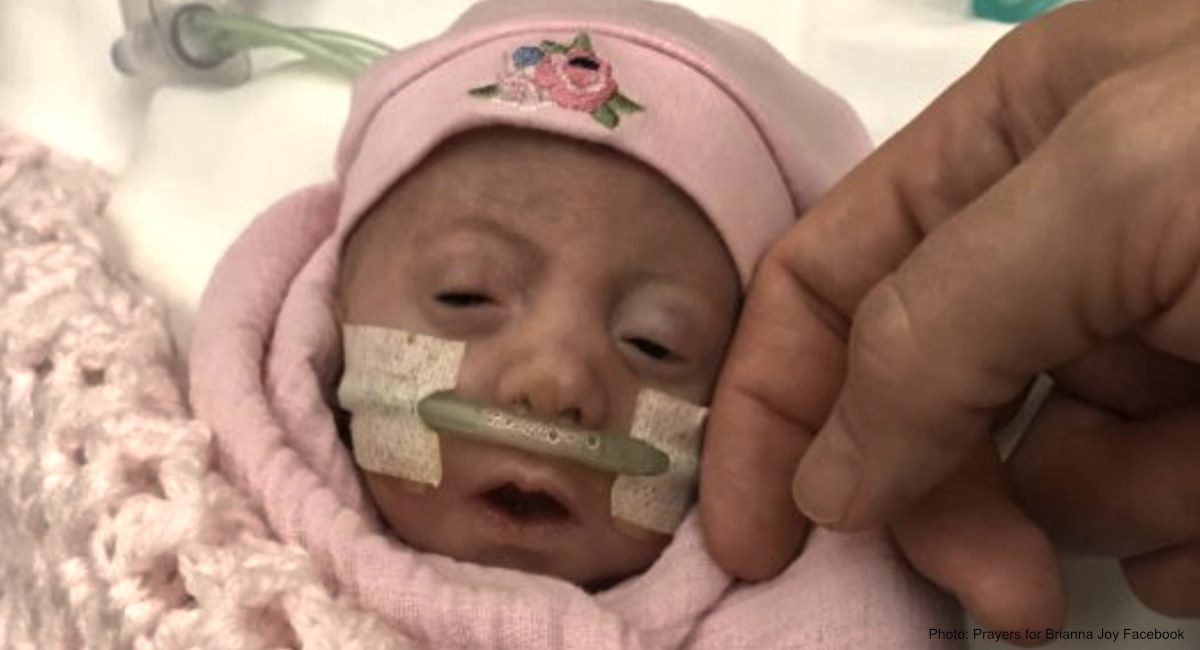Atop a Tennessee mountain in 2019, Virginia Delegate Phil Scott and his wife Elisabeth received a devastating phone call. Testing that Elisabeth and their preborn baby girl had undergone pointed to a life-changing diagnosis of Trisomy 18, and she was not expected to live long after birth. The sky around them darkened, and as they cried together, the rain poured down as though God Himself was crying too.
But just as quickly as the storm had come upon them, it rolled out, leaving behind a vibrant double rainbow. It was exactly the sign of hope they needed for the journey they were about to embark upon — a journey that would change their lives forever, for the better.
Trisomy 18
In 2019, Trisomy 18 was still considered “incompatible with life,” but according to the organization SOFT (Support Organization For Trisomy), this moniker is no longer accurate. Trisomy 18 is now considered a “life-limiting” condition because children have been able to live longer lives, thanks to the dedication of parents and medical teams.
At 20 weeks, there had been indications that baby girl Brianna Scott might have Trisomy 18. An ultrasound revealed she had cysts on her brain and a more detailed, follow-up ultrasound revealed that she may not have a stomach, her hands were tightly clenched, and she had holes in her heart. Asked if they wanted to undergo an amniocentesis to verify the diagnosis, the couple considered the risks and asked if there was a benefit to having an official diagnosis. Doctors informed them that confirming Brianna’s diagnosis would allow them to prepare to best care for her. The couple agreed to the amniocentesis but told the medical team that they were going to follow God’s plan for Brianna: life.
At 30 weeks, the amniocentesis confirmed that Brianna had Trisomy 18.
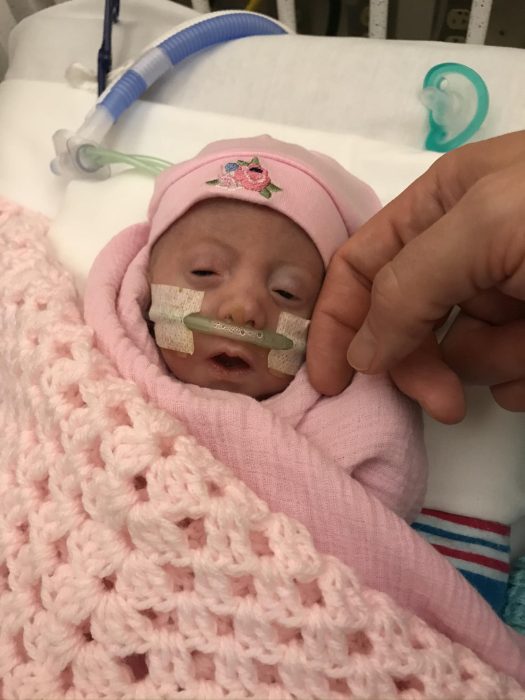
Photo via Prayers for Brianna Joy Facebook page.
“We were fortunate,” Elisabeth told Live Action News. “We did not have a lot of pressure like some families do. … We did get the offer after we had amniocentesis or just before it. They said, ‘Listen, if you guys want to terminate this pregnancy we need to know sooner rather than later.’ … And we said, ‘Well termination is not even something we would think about. We just want to know how to give her the best that we can for the time that we have.'”
Risks for Elisabeth
They were ready to do what it took to care for Brianna, but there were risks for Elisabeth as well. Her pregnancy was surprisingly similar to that of a Texas woman who recently made headlines for suing Texas for the right to abort her preborn daughter who had also been diagnosed with Trisomy 18. Like Kate Cox, Elisabeth had been through two previous C-sections and was at risk of uterine rupture and loss of fertility with each of her subsequent pregnancies. But while Cox sought and eventually underwent a D&E dismemberment abortion, Elisabeth carried Brianna to term. When they heard about Cox, the couple felt compassion alongside frustration.
“I’ve been there, laying on my back with the ultrasound wand on my stomach having had two previous cesareans, and being told this is now a high-risk pregnancy and your baby’s probably not going to live,” said Elisabeth. “It really is scary. So yes, we have compassion for the [Cox] family but also — having had the good experience that we’ve had, where we’ve had the support of practitioners who said, ‘We’re going to treat your child as if they’re any child’ — there’s a part of me that’s frustrated that there are still people in the medical community that are using outdated information. … It’s frightening parents. It’s making them feel like they’re backed into a corner and they don’t have any other options. It’s not an easy road to walk, I completely understand, but … I get frustrated with the people who are speaking to these families that have been given this diagnosis and are in a roundabout way saying, ‘You’re not capable of taking care of this.'”
Brianna’s birth
At 34 weeks, doctors determined that Brianna needed to be delivered. Convinced that Brianna was going to die shortly after birth, the couple was understandably concerned. Then, a neonatologist partnered with Children’s National Hospital walked into the room.
“He asked… ‘If she shows signs of life do you not want me to help her?'” said Phil. “And I believe he worded it that way intentionally. … He didn’t say intervene… he said ‘help.’ And then I said, ‘Of course I want you to help my daughter.’ And then he said, ‘Even if that means intubating her?’ I said, ‘Yes, if she shows signs of being able to breathe but needs help, then help her.’ That one question was a turning point.”
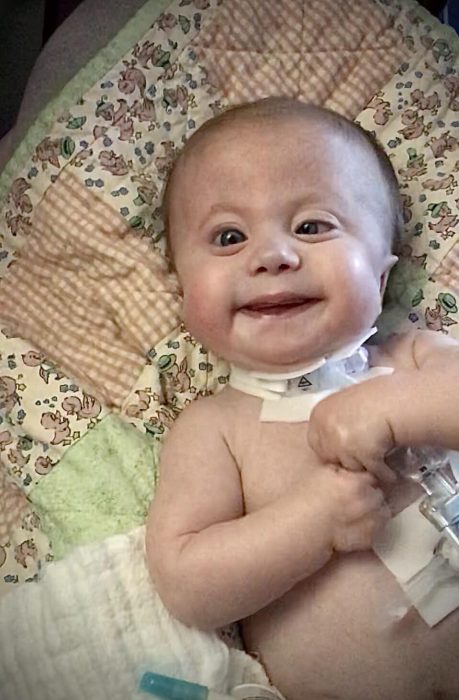
Photo via Prayers for Brianna Joy Facebook page.
Brianna was born alive weighing just three pounds. She let out a cry, but she needed help. Doctors intubated her, and an x-ray showed that she did have a small stomach but it was not connected to her esophagus. She was flown to Children’s National to be evaluated for surgery.
“I can’t relive this without getting teary-eyed and choking up just because of how amazing God has been through this entire thing,” said Phil. “… The doctor came and he was excited to perform the surgery. He had performed the surgery on three other children with Trisomy 18. Two were successful and one was not and unfortunately, all three of those children didn’t live to be more than a month. And so he was excited to try it again and to help one of these children to live.”
Brianna’s surgery was successful. Elisabeth noted that Brianna’s doctors rarely talked about Trisomy, instead, they focused on her other health concerns and how to treat them. She hopes all providers, caregivers, and doctors act this way because Trisomy conditions “are not in and of themselves a death sentence.” Many of the concerns with Trisomy 18 can be surgically corrected or supported with therapy or interventions going forward.
Going home
Brianna was discharged from the hospital on concurrent care, which allowed her to receive the treatment she needed while also receiving hospice care. She was able to be home for her first Christmas, but in January, her heart was failing.
While doctors are expected to repair holes in the hearts of typical children, this hasn’t always been the case for children with Trisomy 18. Pediatric cardiologist Thomas Collins explained in 2018 that for children with Trisomy 18, surgery has rarely been an option. “The thought has been it doesn’t make sense to undertake a major heart surgery if the patient’s death within a few months is a near certainty,” he said.
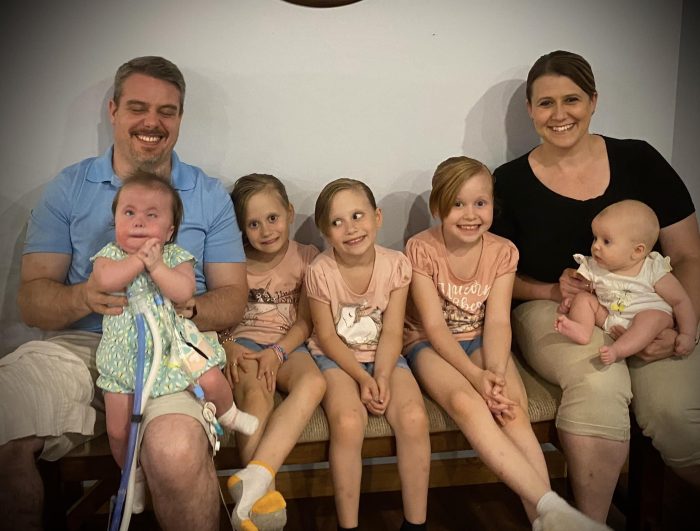
Photo via Prayers for Brianna Joy Facebook page.
But, in a study published in Pediatrics, Collins and his colleagues from the University of Arkansas for Medical Sciences showed that heart surgery can more than double the life spans of babies with Trisomy 18 as well as those with Trisomy 13. Heart surgery increased survival and hospital discharge from 33% to 67%, and that benefit lasted two years.
When the Scotts learned that Brianna’s cardiology team would be performing surgery to repair her heart, Phil said, “I about collapsed to the floor.”
Brianna survived the surgery and remained in the hospital recovering for months as the Covid-19 pandemic set in. She needed a tracheotomy and the use of a ventilator but ultimately was able to go home with continued concurrent care.
Brianna did so well that she was discharged from hospice. She deals with health issues including pulmonary hypertension, but is otherwise doing well.
Everyday, ordinary life
Since welcoming Brianna, the Scotts have added a fifth daughter to their crew, which includes Alaina, age 10, twins Lydia and Julia, age nine, Priscilla, age two, and Brianna, age four, who are all homeschooled. Brianna has recently started walking in therapy. They have been open with their children about Brianna’s health, including the fact that she may not live long.
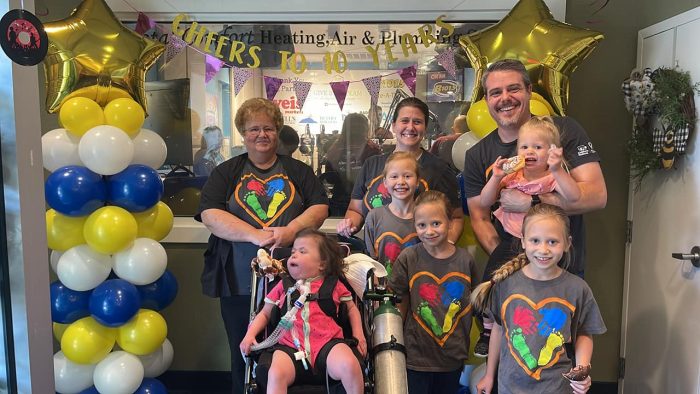
Photo via Prayers for Brianna Joy Facebook page.
“The second Christmas Brianna was here we all sat down at the dinner table … one of the twins, who was maybe about five or six at the time, prayed and she said, ‘God, thank you so much for my family and thank you so much that you let Brianna stay with us for another Christmas,'” said Elisabeth. “And I got choked up because it was so sweet to hear those words from her — very much like you’re playing with your best friend and you know they have a place to go. They are eventually going to have to leave but you want to make the most out of the time you have and you’re grateful for another one. And that became our marching tune.”
In 2021, Brianna was invited to be the Children’s Miracle Network Champion for 2021, which Phil calls a “huge answer to prayer.”
“We asked God that no matter how long or how short her life is, He allows us to use her story to bring hope and encouragement to others,” he explained.
Brianna continues to defy the odds. Doctors initially said if she did live, she would essentially have no function — that she wouldn’t smile, or interact, or even remember who they were.
“None of these have been proven true. She lights up when her sisters come in the room. She thinks it’s hysterical when the two-year-old pitches a fit. She has a favorite nurse. She loves our therapist but also doesn’t love our therapist because she knows she’s there to make her work. She has a personality,” said Phil.
In her four years, Brianna has spent 329 days in the ICU with 13 hospitalizations, four air transports, six surgeries, and dozens of procedures. She has also participated in two medical studies, inspired bill HJ 510 to designate March as Trisomy Awareness Month in Virginia, and has been on adventures to the Natural History Museum, National Christmas Tree, Annual Cherry Blossom Festival, Flying Circus, and Hot Air Balloon Festival. She’s been to the nation’s capital, and the state capital, and countless church and family events.
“There are two things that medical science will never be able to account for. First and foremost is God,” said Phil. “We’ve had doctors who can’t account for the God factor. And the other thing they can’t account for is the power of the love of family. You put a child in a home setting, they have seen it over and over again … the child will grow and thrive and excel in their development more so than they would in a hospital setting because of the love element.”
Spiritual warfare
In 2021, Phil ran for the Virginia House of Delegates. It was a busy year of fundraisers for both his campaign and the hospital, and Brianna had several hospitalizations. During one specific hospitalization, Brianna was not expected to survive. They began making plans for her funeral. But then Phil experienced a moment of peace and clarity.
“I was at a dinner for a local charity that supports single moms … and I was sharing with someone about Brianna and explaining the situation of what we were dealing with. Then out of my mouth came, ‘It’s just spiritual warfare of Satan trying to distract me from what God wants me to do.’ And I froze, I got up, I walked out and I called Elisabeth … and I said, ‘Brianna’s going to be okay. This is just spiritual warfare to distract us from what God has called us to do. She’s coming home. We’re giving this over to God.'”
Elisabeth added, “He’s gotten us this far and He’s got a plan for her.”

